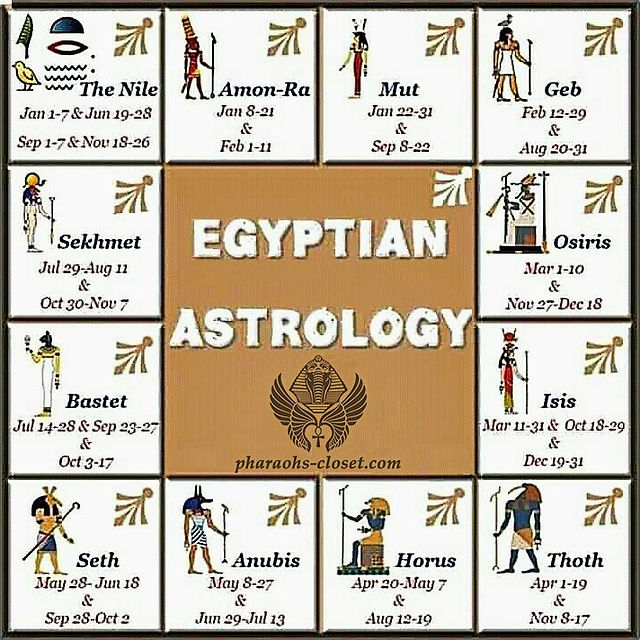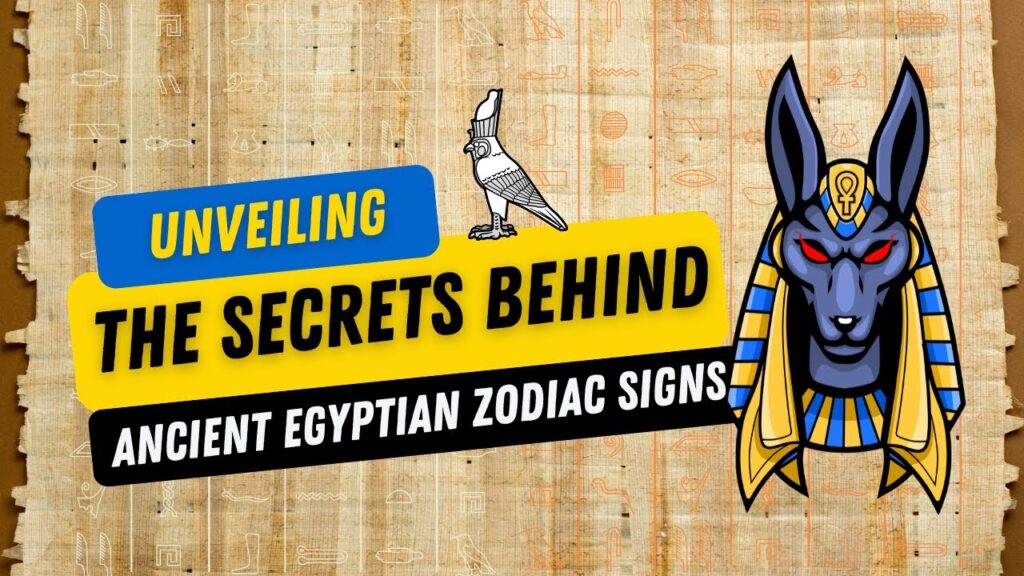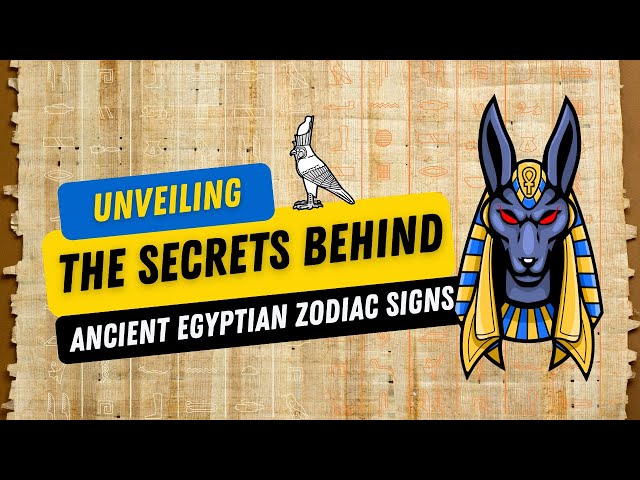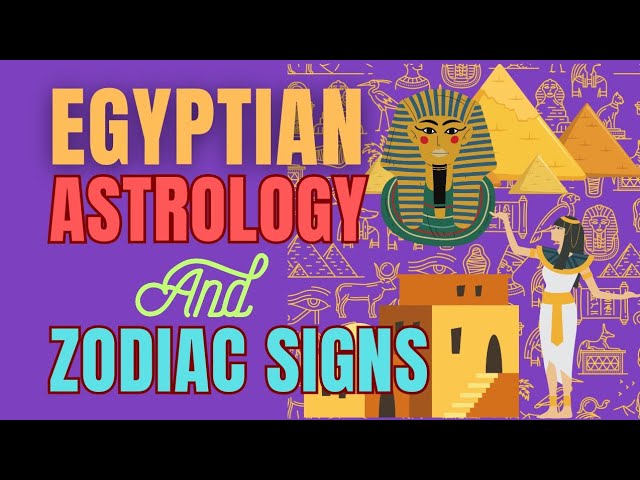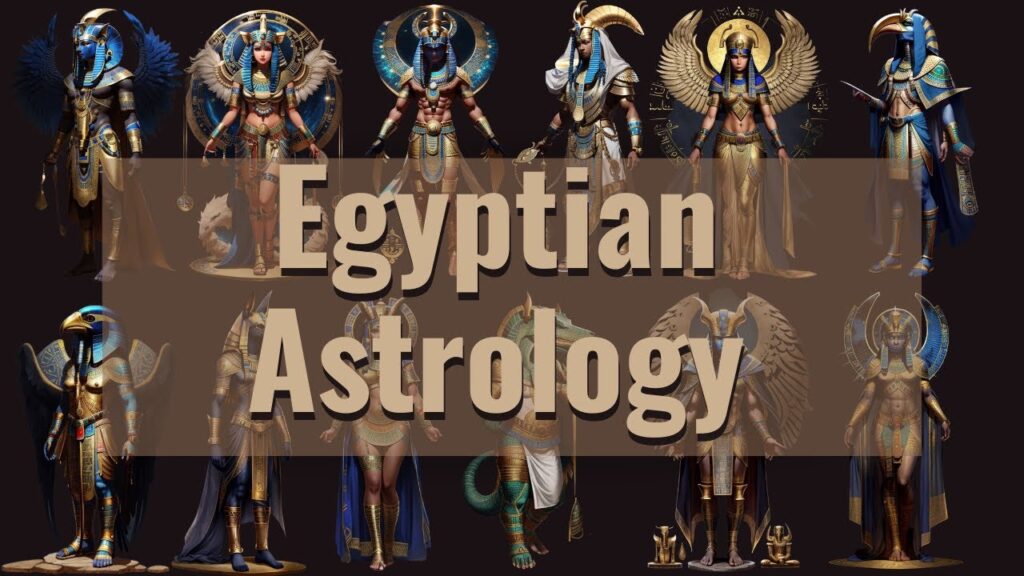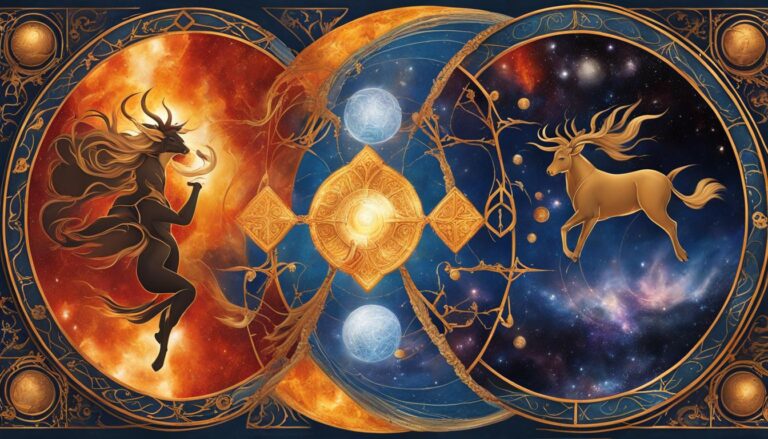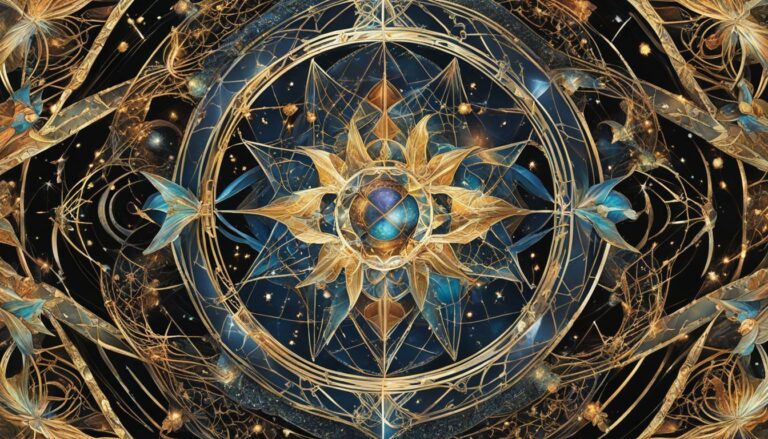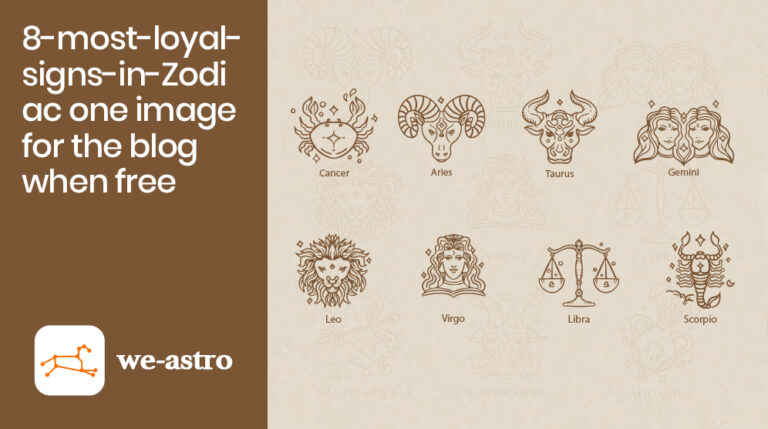As intrigued seekers on a quest for ancient wisdom and celestial knowledge, let us embark on an enlightening journey, exploring the enigmatic realm of Egyptian zodiac signs. The profound mysteries of this ancient astrology, veiled by the sands of time, shall shed a unique light on how celestial bodies were revered by the Egyptians in shaping the understanding of a person’s traits, skills, and their future.
History of Egyptian Zodiac Signs
Ancient Egypt fascinates us with its grandeur, mystery, and complexity. One of the captivating aspects of its rich history is the Egyptian Zodiac Signs. An integral part of their religious and social life, these signs reveal the depth and wisdom of their astronomical understanding.
Origin and development
The Egyptian Zodiac is believed to have originated around 3300 BC. The ancient Egyptians were keen observers of the night sky, carefully recording the movements and patterns of the stars. They noticed that certain stars rose just before the sun and these stars, in groups of three, became the basis for the Zodiac signs. Over time, their understanding became more sophisticated and they began to use these signs not only in their religious rituals, but also in predicting the future and guiding their daily lives.
Influence on Greek Astrology
It’s interesting to note that the Egyptian Zodiac had a significant influence on the development of Greek Astrology. When Alexander the Great conquered Egypt, the cultures intermingled, leading to a fusion of knowledge. The Greek astrologers, inspired by the deep understanding of the Egyptians, incorporated many elements of the Egyptian Zodiac into their own practice.
Completion of the Zodiac
The completion of the Egyptian Zodiac is believed to have occurred around 50 BC with the addition of the last sign. It was then that the system was finalized, with twelve signs representing different periods of the year. This Zodiac is a testament to the sophistication and dedication of the ancient Egyptians to the study of the stars.
Understanding the Egyptian Zodiac
To fully comprehend the Egyptian Zodiac, it is essential to grasp its underlying principles and uniqueness.
Explanation of the Egyptian Zodiac
The Egyptian Zodiac is based on the tessaric cycle, a period of 360 days that they divided into twelve months. Each month was then linked to a certain god, associated with a specific Zodiac sign. These signs, unlike those of the modern western astrology, are not primarily based on constellations but align with the phases of the Nile.
Differences from other forms of Astrology
One critical distinction of the Egyptian Zodiac from other forms is its focus on the decans, a set of 36 star formations that divide the night sky into equal parts. These decans are prominent in Egyptian temple architecture and deeply connect to their religious beliefs.
Importance of Birth Dates
In the Egyptian Zodiac, birth dates are very crucial. Each Zodiac sign corresponds to a specific interval of dates in the year, characterized by the presiding god during that period. The birth date signifies the qualities and destiny of an individual in line with the respective Zodiac sign.
Symbols of the Egyptian Zodiac
The beauty of the Egyptian Zodiac lies in its vivid symbols, which carry profound meanings.
List and explanation of the symbols
The twelve symbols of the Egyptian Zodiac are associated with different gods. For example, the mythical creature Ammut represents the period from 8th to 21st of January and Amon Ra from 8th to 21st of February. Each symbol has a unique story and power attached to it, providing insights for those born under that sign.
Assertiveness of the symbols
The assertiveness of these symbols is reflected in their strength, ability to take command, and resistance to change. This can be especially seen in signs such as Sekhmet (29th of July to 11th of August), representing assertiveness and bravery.
Significance of animal symbols
Animal symbols are significant in the Egyptian Zodiac, embodying the divine, the terrestrial, and the cosmic forces. For instance, the sphinx that symbolizes Thoth is a blend of a human head and a lion’s body, indicating intelligence and might.
The Geometry of Egyptian Zodiac Signs
Geometry plays an essential role in understanding the Egyptian Zodiac signs, contributing to their beauty, balance, and symbolism.
Use of geometric patterns
Each sign incorporates intricate geometric shapes and patterns. These not only form a beautiful visual aspect but also add to the metaphysical understanding of the signs. Each pattern indicates a connection to the divine, the cosmos, and the natural world.
Circles and the Zodiac
Circles are a prevalent element in the Egyptian Zodiac. They symbolize the cyclic nature of time and the universe, reinforcing the concept of life-death-rebirth cycle. The recurring celestial cycles of birth, zenith, descent, and underworld are mapped onto this circle, marking the birth dates for respective Zodiacs.
Sacred Geometrical connections
The use of sacred geometry further enhances the symbolism and deeper understanding of the Egyptian Zodiac. Various shapes like the vesica piscis, the triangle, and the spiral are used, signifying creation, balance, and growth respectively.
The 12 Egyptian Zodiac Signs
These Zodiac signs represent an in-depth understanding of human personality traits, symbolizing a connection to the divine.
Breakdown of each Zodiac Sign
Each Zodiac sign, associated with a particular god, has unique traits. For instance, people born under Bastet (14-28 July) are viewed as individuals with strong intuitions, while Geb (12-28 February) signifies love and kindness.
Important Traits of each Sign
The dominant traits of each sign are influenced by their associated god. The god Anubis, for instance, grants its people a contemplative and insightful nature whilst Osiris marks individuals with traits of renewal and rebirth.
Sign compatibility
Understanding the compatibility between different signs can forge stronger relationships and better cooperation amongst individuals. For example, those born under Bastet and Sekhmet tend to have compatible personalities, being both courageous and assertive.
Decans in Ancient Egyptian Astrology
Decans hold a vital place in understanding and interpreting the Egyptian Zodiac.
Understanding Decans
Decans, units of ten degrees each, segment the celestial sphere into 36 parts. The Egyptians used these divisions to monitor the night sky and mark their calendars.
Importance of Decans in interpreting Zodiac signs
Decans play a pivotal role in interpreting Zodiac signs. Each constellation has three associated decans, revealing additional nuances about an individual’s traits, destiny, and life events.
Famous examples of Zodiac Decans in Egyptian culture
Famous examples of Zodiac decans are found in the Dendera Zodiac, an ancient bas relief temple ceiling depicting all 36 Decans, reinforcing the important part they played in Egyptian astrology and culture.
Influence of Egyptian Zodiac Signs on Individual’s Personality
The Egyptian Zodiac has a profound effect on an individual’s personality, affecting various aspects of their life.
Traits and characteristics
Each Egyptian Zodiac Sign is associated with certain personality traits. For instance, people born under Anubis are known for their wisdom and intuition, while those under Bastet are known for their leadership and courage.
Role in personal relationships
The Zodiac also plays a role in personal relationships, providing insights into an individual’s compatibility with others, strengths, weaknesses, and potential conflicts.
Influence on career paths
The Zodiac can guide individuals toward suitable career paths. For instance, those under the sign of Thoth, known for their wisdom and knowledge, usually excel in scholarly or academic occupations.
Interpreting the Egyptian Zodiac
The interpretation of the Egyptian Zodiac requires a deep understanding of its connections and symbolism.
Interpreting Zodiac Birth Charts
Zodiac birth charts reveal an individual’s inherent traits and potential path in life. They require interpretation based on the corresponding Egyptian god, associated personality traits, and influence of decans.
Role of Planets and Houses
In addition to the Zodiac signs, the planets and houses also play a significant role in the astrological interpretation. Each planet represents different aspects of life, influencing the individual’s destiny.
Meaning behind Sun and Moon positions
The position of the Sun and Moon in the chart reveals more about an individual’s personality. The Sun represents our core self, while the Moon symbolizes our emotions and subconscious mind.
Egyptian Zodiac in the Modern World
Despite ancient origins, the fascination and respect for the Egyptian Zodiac continue in the modern age.
Continued popularity
The Egyptian Zodiac signs continue to attract interest worldwide due to their unique representations, profound meanings, and the mystery that surrounds them. They are used in various forms like tattoos, jewelry, and artwork for their beauty and symbolic significance.
Influence on contemporary astrology
Egyptian astrology has influenced various contemporary systems, especially the Greek one, which in turn significantly influenced modern Western astrology.
How to get an Egyptian Zodiac reading
Getting an Egyptian Zodiac reading involves consulting knowledgeable experts who can interpret the birth charts accurately. Remember, each sign reveals unique strengths, challenges, and life paths.
The Mystery and Significance of Egyptian Zodiac Signs
The Egyptian Zodiac is a testament to the wisdom and sophistication of ancient Egypt. They contain tremendous historical, cultural, and symbolic significance.
Unanswered questions
Despite significant progress in our understanding, various aspects of the Egyptian Zodiac are still shrouded in mystery. The exact process of their creation, the full extent of their influence, and the complete comprehension of their meanings are yet to be discovered.
Symbolism and significance
The Egyptian Zodiac unveils a deep-rooted symbolism, associating humans, the divine realm, and the universe. Each sign, linked with a god and animal symbol, imparts an understanding of cosmic rhythm and human nature.
Cultural and historical importance
The Egyptian Zodiac signs carry a tremendous cultural and historical significance. They reflect the spiritual beliefs, astronomical knowledge, and artistic brilliance of ancient Egyptians. As we explore them, we connect with the wisdom of an ancient civilization, gaining insights into their world and ours.
- Unveiling the Truth: Are Scorpio and Pisces Soulmates? - January 13, 2024
- Understanding What a Pisces Man Dislikes in a Woman - January 12, 2024
- Unveiling Artists with Pisces Moon: Astrology Meets Artistry - January 11, 2024
